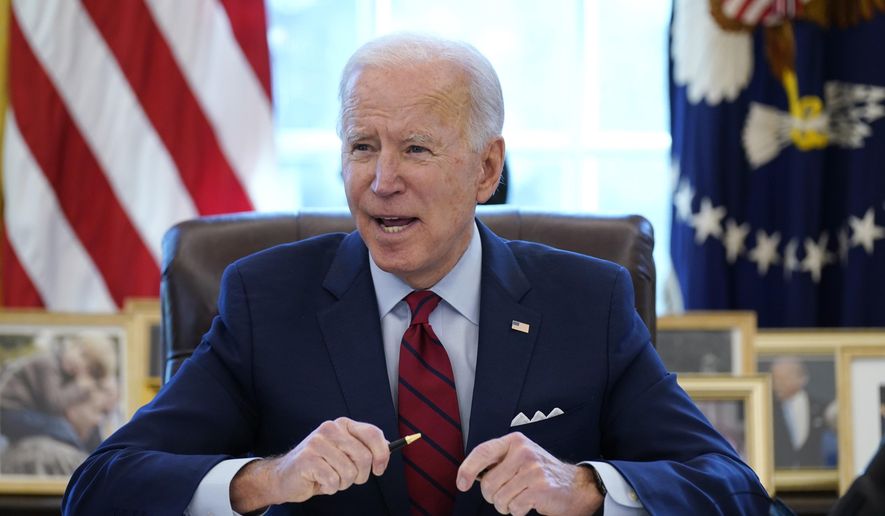President Biden’s vow to expand U.S. engagement with allies will be put to the test later this week when he participates in a virtual meeting with leaders of the world’s wealthiest democracies and then delivers remarks to the annual Munich Security Conference.
Administration officials say the online gathering Friday of the leaders of the G-7 — the U.S., U.K., France, Germany, Italy, Canada and Japan — will focus mainly on global COVID-19 responses and the world economy, with Mr. Biden planning also to press for ways the group can better work together in dealing with China.
Former President Trump showed little affection for the gathering of industrial democracies, lobbying unsuccessfully to re-admit Russia to the gathering and failing to convene an actual or virtual summit last year when it was Washington’s turn to host.
Mr. Biden will separately speak Friday at the prestigious Munich conference, which is also being held online this year. White House spokesperson Jen Psaki said the president will focus his remarks on “the need for the United States and Europe to take on global challenges together.”
Both events come as Mr. Biden seeks to portray himself as more eager than Mr. Trump was to work with America’s allies and to engage more deeply in multinational organizations during his one term in office.
Mr. Trump, who had little time for many of the foreign policy establishment traditions of the presidency, drew praise from many Republican for his “America First” approach that saw him pull the U.S. out of such multilateral initiatives as the World Health Organization (WHO) and the Paris climate pact and the Iran nuclear deal.
That made for some awkward moments at the G-7 summits and at the annual Munich conference, most notably in 2019 when then-Vice President Pence’s message of greetings from Mr. Trump met with a stony silence from the Munich audience.
Mr. Biden has already re-entered the Paris accords and the WHO, and administration officials see this week conference’s as a coming-out party for a more alliance-focused foreign policy.
The White House over the weekend said Mr. Biden hopes to use the G-7 as a platform through which to project U.S. leadership beginning with the COVID-19 pandemic response.
The virtual summit “will provide an opportunity for President Biden to discuss plans to defeat the COVID-19 pandemic and rebuild the global economy,” the statement said, adding that the president will focus on a range of issues, including coordination on vaccine production and distribution.
It also said Mr. Biden plans to discuss “the global economic recovery,” with a particular focus on ensuring the recovering “is inclusive and benefits all workers, including women and members of historically disadvantaged groups.”
Friday’s G-7 meeting comes at a moment when many see China pressing to replace the U.S. and its network of allies as the world’s most go-to economic partner. Beijing has seized on the coronavirus-induced global economic crisis to advertise its vaccine supply lines to countries in Eastern Europe, Asia and Africa, an extension of President Xi Jinping’s “Belt and Road Initiative” to supply vast sums of infrastructure financing around the world.
U.S. officials have criticized the BRI campaign, claiming the terms of China’s loans are legally murky and that Beijing is engaged in predatory lending designed to pressure weaker nations into allowing Chinese access to their natural resources.
In its statement over the weekend, the White House said Mr. Biden will use the G-7 meeting to discuss “the importance of updating global rules to tackle economic challenges such as those posed by China.”
Another potentially sensitive issue likely to arise at the meeting involves ongoing efforts by the other G-7 nations to develop an international mechanism for taxing giant global digital companies, such as Amazon and Alphabet, the parent company of Google.
The issue was raised during a preliminary meeting last week between U.S. Treasury Secretary Janet Yellen and her G-7 counterparts. Reuters reported that U.K. officials called on the G-7 to embrace a joint approach to taxing internet giants by mid-2021, a deadline agreed by the wider Group of 20 nations.
While the former Trump administration sharply opposed the idea, Biden administration officials appear willing to enter the debate.
“The President “recognizes this is a global problem and requires a global solution,” White House spokeswoman Jen Psaki said. “He wants to work, on a multilateral basis, to achieve reform that will strengthen the U.S. economy and benefit U.S. workers.”
She added, “It’s not just a problem here in the United States of us just adjusting our own policy. Right? It’s something that there needs to be agreement internationally, and obviously a conversation among the G-7 finance ministers.”
• Guy Taylor can be reached at gtaylor@washingtontimes.com.




Please read our comment policy before commenting.